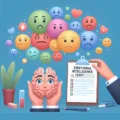Emotional Intelligence (EI) is a crucial factor for personal and professional success. Understanding and improving your EI can lead to better relationships, higher job performance, and overall mental well-being. In this article, we explore the top 5 books on emotional intelligence, with our staff picks to guide your reading journey.
1. Emotional Intelligence 2.0 by Travis Bradberry and Jean Greaves
This book is a comprehensive guide to understanding and improving your EI. Bradberry and Greaves provide practical strategies and tools to enhance your emotional intelligence, making it a must-read for anyone looking to develop their EI skills.
- Key Features:
- Self-assessment tools
- Actionable strategies
- Real-life examples
2. Emotional Intelligence: Why It Can Matter More Than IQ by Daniel Goleman
Daniel Goleman’s groundbreaking work on emotional intelligence has become a classic in the field. This book explores the importance of EI in personal and professional success, providing insights into how emotional intelligence can be developed and nurtured.
- Key Features:
- Scientific research
- Real-life applications
- Comprehensive overview
3. The EQ Edge: Emotional Intelligence and Your Success by Steven J. Stein and Howard E. Book
The EQ Edge delves into the various components of EI and how they contribute to success. Stein and Book provide a thorough analysis of emotional intelligence, offering practical advice for improving EI in different areas of life.
- Key Features:
- In-depth analysis
- Case studies
- Practical exercises
4. Primal Leadership: Unleashing the Power of Emotional Intelligence by Daniel Goleman, Richard Boyatzis, and Annie McKee
This book focuses on the role of emotional intelligence in leadership. Goleman, Boyatzis, and McKee provide valuable insights into how leaders can harness the power of EI to inspire and motivate their teams.
- Key Features:
- Leadership strategies
- Real-world examples
- Actionable advice
5. The Emotional Intelligence Quick Book by Travis Bradberry and Jean Greaves
Another excellent book by Bradberry and Greaves, The Emotional Intelligence Quick Book offers a concise and practical guide to understanding and improving your EI. It’s perfect for busy professionals who want to enhance their emotional intelligence skills quickly.
- Key Features:
- Quick tips
- Self-improvement strategies
- Easy-to-read format
Our Staff Picks
In addition to the top 5 books mentioned above, our staff has handpicked a few additional titles that are worth exploring:
Emotional Intelligence for Dummies by Steven J. Stein
This accessible guide provides a thorough introduction to emotional intelligence, making it an excellent choice for beginners.
Working with Emotional Intelligence by Daniel Goleman
Goleman’s follow-up to his original book delves deeper into the application of EI in the workplace, offering practical advice for enhancing job performance.
Emotional Agility by Susan David
Susan David’s book explores the concept of emotional agility, providing strategies for adapting to life’s challenges and maintaining emotional balance.
FAQ
1. What is emotional intelligence?
Emotional intelligence is the ability to recognize, understand, and manage our own emotions and the emotions of others. It involves skills such as emotional awareness, empathy, and emotional regulation.
2. Why is emotional intelligence important?
Emotional intelligence is important because it helps individuals build better relationships, communicate effectively, and navigate social complexities. It is also linked to higher job performance and overall mental well-being.
3. How can I improve my emotional intelligence?
Improving emotional intelligence involves self-awareness, self-regulation, social skills, empathy, and motivation. Reading books on EI, practicing mindfulness, and seeking feedback from others can help enhance these skills.
4. Can emotional intelligence be learned?
Yes, emotional intelligence can be learned and developed over time. With dedication and practice, individuals can improve their EI skills and apply them in various aspects of their lives.
5. Are there any tools to measure emotional intelligence?
There are several tools available to measure emotional intelligence, including self-assessment questionnaires, the Emotional Quotient Inventory (EQ-i), and the Mayer-Salovey-Caruso Emotional Intelligence Test (MSCEIT).









